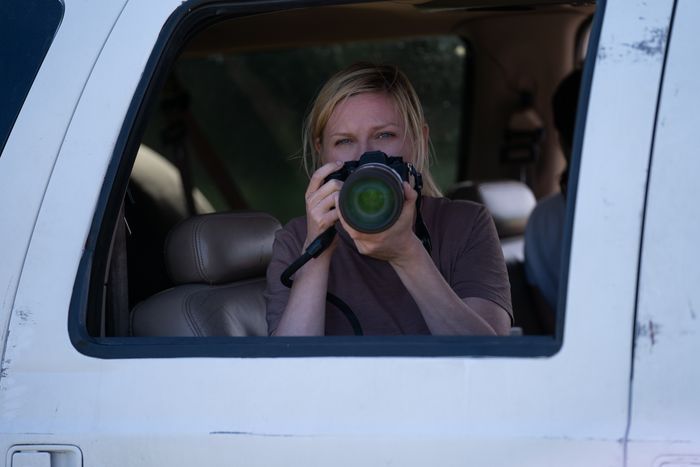
The politics of Civil War are nonpartisan and vague on purpose, according to writer-director Alex Garland. The A24 film, in theaters now, depicts a homegrown conflict through the eyes of journalists and shies away from mapping today’s partisan politics onto its own imaginary land of the free and home of the brave. Kirsten Dunst is a war photojournalist traveling with her reporting partner (played by Wagner Moura) to interview America’s fascist president (Nick Offerman) in Washington, D.C., accompanied by their mentor (Stephen McKinley Henderson) and Cailee Spaeny as a tag-along aspiring photographer. Civil War is supposed to be a direct response to our country’s — any country’s — divisiveness on both sides of the aisle. “Why are we shutting [conversation] down?” Garland wondered at a South by Southwest panel on March 15, the day after the film’s world premiere. “Left and right are ideological arguments about how to run a state. That’s all they are. They are not a right or wrong, or good and bad.”
Garland’s comments practically rage-baited the internet, and factions criticized his decision to release the film in an election year and provoke conspiracy theories about an actual impending civil war. In an interview with Entertainment Weekly, he urged his audience to make up their own mind about what the film is trying to say. “The viewer is required to make their own interpretation,” the director said. “The film is actually being opaque. It’s forcing the viewer to ask questions.” Critics agree with Garland’s framing. The New York Times wrote that Garland’s film largely presents “a post-ideological landscape,” while The Guardian said it’s a “spectacular if evasively apolitical ‘civil war.’” With this kind of ambivalent posturing, what has the cast said about the film’s murky politics?
April 2, 2024: The Civil War cast’s press run begins with a Kirsten Dunst spread in GQ Hype, where the actor says the film isn’t a political commentary so much as it’s a horrifying allegory for where our country could be headed. “This movie is so terrifying and effective because it’s set in America, a place where you never feel like this could happen,” she says. It caused a gut reaction. “I was just so shook. I didn’t know what to do with myself.” She calls it a realistic “warning or fable about what happens when the wrong people are in power.” Sounds familiar …
But Nick Offerman denies that his character represents Donald Trump. “Honestly, [the Trump comparison] didn’t even come up,” Offerman tells The Hollywood Reporter at a Civil War red carpet, adding that the film “is so unrelated to any actual factions or politicians. That’s what I think is so brilliant about this film. Everybody on any side of the aisle or any faction has a lot to say, and we’re all immediately divisive and partisan in our conversations.” He continued, “Everybody’s mad about those other jerks, and this movie transcends that. It’s about all of us. And I’m so grateful for that.” According to Offerman, it would be easy for the film to make on-the-nose analogies, “but you would lose half your audience this way or the other.” Instead, it asks audiences to reconsider “the direction we’re heading.” To summarize: It’s not about now, it’s about the future, but also … us, now.
April 3, 2024: In an interview with Variety, Dunst agrees that the film is political despite publicists saying otherwise. “So do you believe that it’s not political? I mean … it’s an anti-war film,” she tells Variety. “This movie, after you see it, you want to talk about it for a while with people. And I think any movie that does that is incredible.” The actor does not believe that the film’s president is a stand-in for Trump, however. “It feels fictitious to me,” she says. “I don’t want to compare because that’s the antithesis of the film. It’s just a fascist president. But I didn’t think about Nick’s character being any certain political figure. I just thought this is this president, in this world, who will not abide by the Constitution and democracy.”
April 7, 2024: The cast discusses the film’s politics in a CBS News panel, continuing to be vague about the matter. “Now I’m really making an effort to sit down and listen to people that I disagree [with],” Moura tells the panel. “And I was absolutely surprised to see that if you value democracy, if you think that democracy is an important thing, then there’s lots of common ground.” For Spaeny, the film’s warning about the consequences of divisiveness shook her like it did Dunst. “It was the first time that I felt like the message really went through me,” she says. “You know, it felt like a gut punch. And I came out of it feeling like I want to take action, you know, that I don’t want it to ever get to this point.”
Dunst says the main takeaway of the film isn’t politics. “At the heart of all of this, it’s really about humanity and what happens when people stop treating each other like human beings.”
April 8, 2024: Wagner Moura admits that the film made him reevaluate his own approach to politics. “I don’t believe that films have a message,” he tells MovieWeb. “I think that the great thing about movies, and any art form, actually, is that people can have different reads on it. I can tell you what changed for me from after I wrapped this film. I honestly started to really try to listen to people that think differently, politically, from me. That’s been a great exercise in my life. Because I’m finding that there is more common ground than I thought. If our differences are only about how the state should deal with things, I think we should totally try to listen to each other.”
In a different interview with the Playlist, Dunst says the film is about the end result of global political issues. “It’s going on all over the world,” she says. “The Ukrainian-Russian War started when we were rehearsing. This will always be a global issue: polarization. And I feel like this movie is haunting for people because it does leave you with a lot to think about. I mean, it is an anti-war film, in my opinion, and we’re not spoonfeeding the audience at all. It’s really for you to ingest. But I think what’s powerful about the film is it gets people talking about what’s wrong.” That doesn’t mean Civil War is partisan. “It’s about how important journalism is,” she says in an interview with IndieWire. “I think that once the movie comes out, people will realize that it’s not taking a stance in any political direction.” Vulture critic Bilge Ebiri argues in his review that the lack of political context isn’t so much a means to consider polarization but a tool to question our numbness to journalism that covers conflict around the globe.


